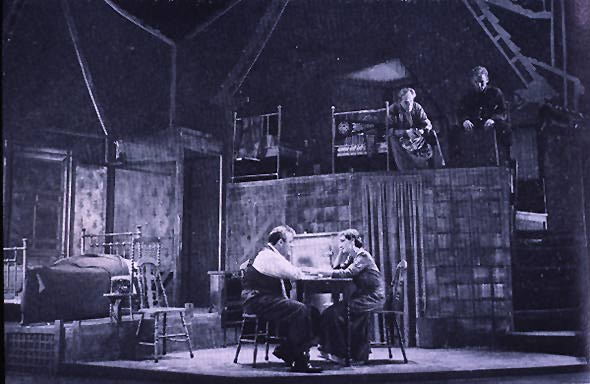My “Sightings” column in today’s Wall Street Journal, like my drama column, is occasioned by the new Broadway revival of Death of a Salesman. Here’s an excerpt.
* * *
George Balanchine, the greatest choreographer of the 20th century, believed that all ballets, even his, were like butterflies: “A breath, a memory, then gone.” Twenty-nine years after his death, Balanchine’s ballets continue to be performed throughout the world, but it’s also true that the way in which they are danced today is not the way in which they were danced when Balanchine himself was around to rehearse them. The steps may be the same, but the nuances are different–sometimes joltingly so…
What is true of ballet is no less true of the other lively arts. Change is built into their natures. You watch a performance and then…it’s gone. All that work, all that passion, all that dedication, and when it’s over, it’s over, leaving nothing but memories–and, if you’re lucky, a recording that can serve as a souvenir, however imperfect, of the experience.
 To be sure, great theatrical performances of the past leave behind a different kind of souvenir, which is their décor. Mike Nichols’ production of Arthur Miller’s “Death of a Salesman,” which opened on Broadway this week, is being performed on a reproduction of the set that was created by Jo Mielziner, America’s most admired and innovative theatrical set designer, for the play’s original 1949 production, and it also makes use of the incidental music composed by Alex North for the same production. Mr. Nichols, who saw “Death of a Salesman” performed on Broadway when he was 17 years old, never forgot the impression made on him by Mielziner’s skeletal set and North’s fragile, wistful score, and so he decided to incorporate them into his own staging 63 years later….
To be sure, great theatrical performances of the past leave behind a different kind of souvenir, which is their décor. Mike Nichols’ production of Arthur Miller’s “Death of a Salesman,” which opened on Broadway this week, is being performed on a reproduction of the set that was created by Jo Mielziner, America’s most admired and innovative theatrical set designer, for the play’s original 1949 production, and it also makes use of the incidental music composed by Alex North for the same production. Mr. Nichols, who saw “Death of a Salesman” performed on Broadway when he was 17 years old, never forgot the impression made on him by Mielziner’s skeletal set and North’s fragile, wistful score, and so he decided to incorporate them into his own staging 63 years later….
Such exhumations are not unprecedented. The New York City Ballet still dances Balanchine’s “Prodigal Son” in front of faithful reproductions of the backdrops that were painted by the French artist Georges Rouault for the 1929 Ballets Russes premiere….
Even so, it is rare for anyone to try to “revive” any aspect of a historically significant theatrical performance, even one as durable as its décor….
* * *
Read the whole thing here.
Archives for 2012
TT: Almanac
“A mother is not a person to lean on but a person to make leaning unnecessary.”
Dorothy Canfield Fisher, Her Son’s Wife
TT: Lookback
 From 2004:
From 2004:
Middle age has its cold consolations, one of which is the knowledge that you’re not nearly as important as you thought you were, or hoped someday to become. I used to save copies of everything I wrote, and for a few years I even kept an up-to-date bibliography of my magazine pieces! Now I marvel at the vanity that once led me to think my every printed utterance worthy of preservation….
Read the whole thing here.
TT: So you want to see a show?
Here’s my list of recommended Broadway, off-Broadway, and out-of-town shows, updated weekly. In all cases, I gave these shows favorable reviews (if sometimes qualifiedly so) in The Wall Street Journal when they opened. For more information, click on the title.
BROADWAY:
• Anything Goes (musical, G/PG-13, mildly adult subject matter that will be unintelligible to children, closes Sept. 9, most performances sold out last week, reviewed here)
• Godspell (musical, G, suitable for children, most performances sold out last week, reviewed here)
• How to Succeed in Business Without Really Trying (musical, G/PG-13, perfectly fine for children whose parents aren’t actively prudish, most performances sold out last week, reviewed here)
• Other Desert Cities (drama, PG-13, adult subject matter, closes June 17, most performances sold out last week, reviewed here)
• Venus in Fur (serious comedy, R, adult subject matter, closes June 17, most performances sold out last week, reviewed here)
OFF BROADWAY:
• Avenue Q (musical, R, adult subject matter and one show-stopping scene of puppet-on-puppet sex, reviewed here)
• Beyond the Horizon (drama, PG-13, extended through Apr. 15, reviewed here)
• The Fantasticks (musical, G, suitable for children capable of enjoying a love story, reviewed here)
• The Lady from Dubuque (drama, PG-13, closes Apr. 15, reviewed here)
• Look Back in Anger (drama, PG-13, closes Apr. 8, reviewed here)
• Million Dollar Quartet (jukebox musical, G, off-Broadway remounting of Broadway production, original run reviewed here)
• Tribes (drama, PG-13, closes June 3, reviewed here)
CLOSING SUNDAY OFF BROADWAY:
• The Agony and the Ecstasy of Steve Jobs (monologue, PG-13, reviewed here)
• Galileo (drama, G, too complicated for children, reviewed here)
TT: Almanac
“The most exhausting thing in life, I have discovered, is being insincere.”
Anne Morrow Lindbergh, Gift from the Sea
TT: A great day
The MacDowell Colony, America’s oldest artists’ colony, has informed me that I’ve been accepted as a guest for a summer residency during which I plan to work on Mood Indigo: A Life of Duke Ellington.
 Located in Peterborough, New Hampshire, the colony was founded in 1907 on the farm of Edward MacDowell, the American composer who is best remembered for “To a Wild Rose.” It contains thirty-two individual studios where writers, composers, painters, and other artists can work in solitude on projects of their choosing. Among the works created there in whole or part are James Baldwin’s Giovanni’s Room, Leonard Bernstein’s Mass, Willa Cather’s Death Comes for the Archbishop, Michael Chabon’s The Amazing Adventures of Kavalier & Clay, Aaron Copland’s Billy the Kid, Virgil Thomson’s The Mother of Us All, Thornton Wilder’s Our Town, and–I am proud to say–Paul Moravec’s score for The Letter. (The picture seen here is of Veltin Studio, where Wilder worked on Our Town and Paul on The Letter.)
Located in Peterborough, New Hampshire, the colony was founded in 1907 on the farm of Edward MacDowell, the American composer who is best remembered for “To a Wild Rose.” It contains thirty-two individual studios where writers, composers, painters, and other artists can work in solitude on projects of their choosing. Among the works created there in whole or part are James Baldwin’s Giovanni’s Room, Leonard Bernstein’s Mass, Willa Cather’s Death Comes for the Archbishop, Michael Chabon’s The Amazing Adventures of Kavalier & Clay, Aaron Copland’s Billy the Kid, Virgil Thomson’s The Mother of Us All, Thornton Wilder’s Our Town, and–I am proud to say–Paul Moravec’s score for The Letter. (The picture seen here is of Veltin Studio, where Wilder worked on Our Town and Paul on The Letter.)
This will be my first stay at an artists’ colony, and I hope to write several chapters of Mood Indigo while in Peterborough, a village to which I have long been attached.
I am immensely grateful to the MacDowell Colony for this priceless opportunity.
* * *
The King Cole Trio plays “To a Wild Rose”:
Mike Daisey’s Secrets of the MacDowell Colony:
TT: Snapshot
Excerpts from Jerome Robbins’ Broadway, as seen on the 1989 Tony Awards telecast:
(This is the latest in a series of arts-related videos that appear in this space each Monday and Wednesday.)
TT: Almanac
“‘I know myself,’ he cried, ‘but that is all.'”
F. Scott Fitzgerald, This Side of Paradise
